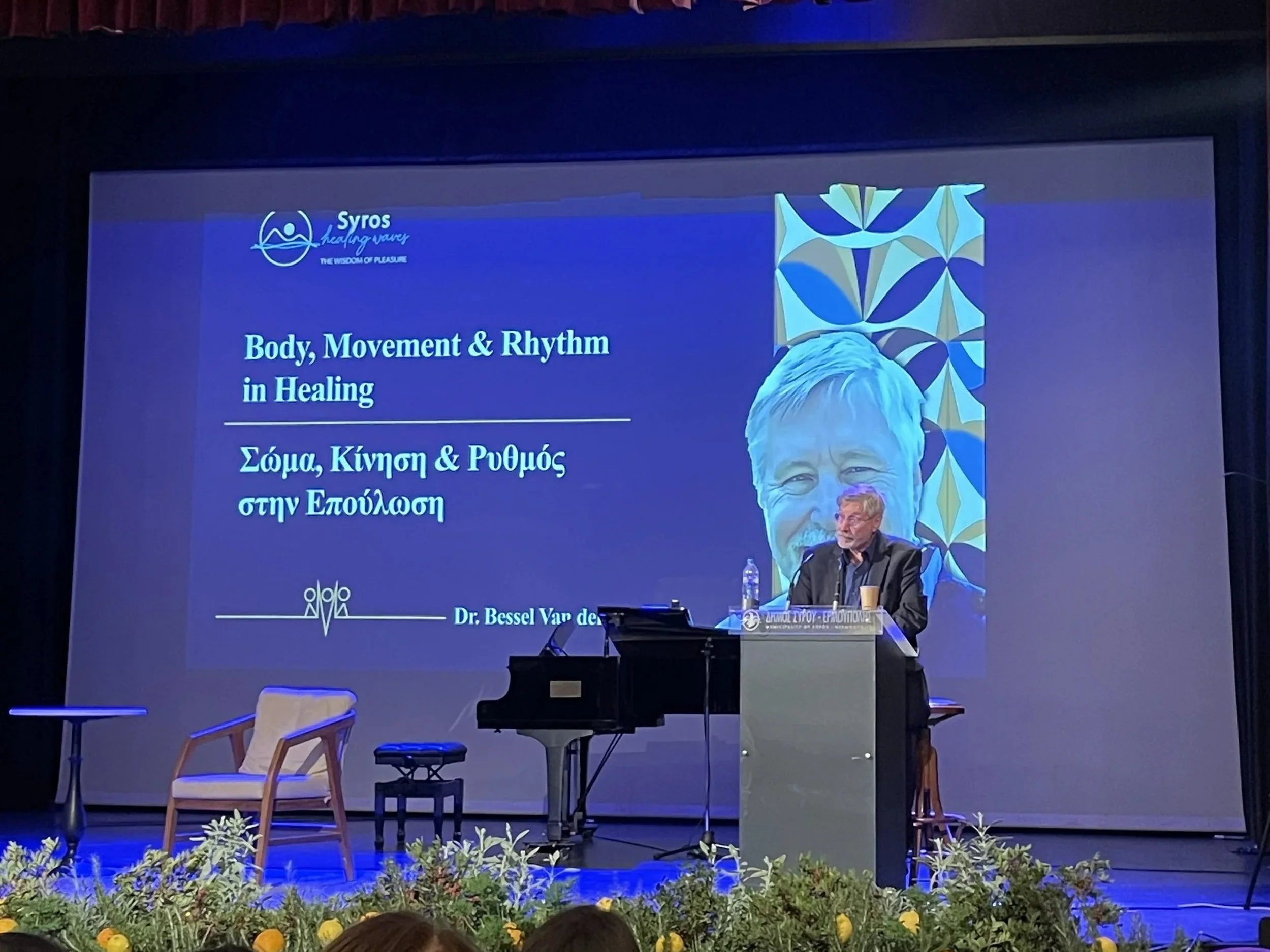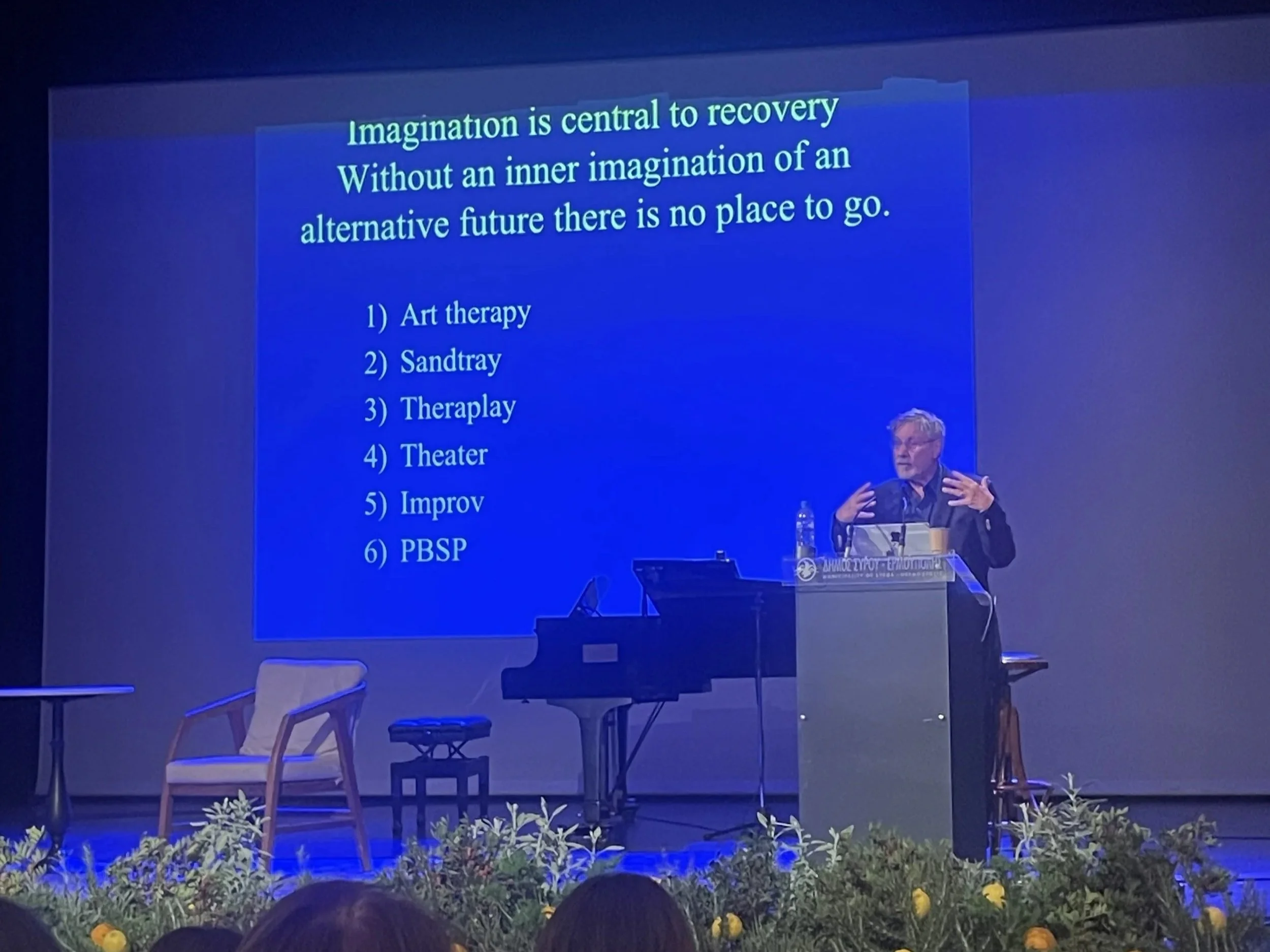What I Learned from Attending a Trauma Conference in Greece (and Seeing Bessel van der Kolk in Person!)
Trauma conference in Syros, Greece with Dr. Bessel van der Kolk
In case you didn’t know — I live on a small island in Greece called Syros. (Random, I know — that’s a story for another day!)
One day, I met a somatic practitioner named Terrence from Colorado (He is amazing! Check out his website here). Having an online-only private practice, I miss connecting with other therapists in person, so when Terrence mentioned a trauma conference happening right here on Syros, I nearly fell out of my chair.
Terrence and I picking up our goodie bags for the Syros Healing Waves Festival:
The Journey from Trauma to Pleasure
I jumped online and gasped out loud — Dr. Bessel van der Kolk, author of The Body Keeps the Score, was scheduled to lecture for most of the conference. What were the odds? A trauma therapist living on a remote island… and Bessel himself coming to speak a few miles away.
It felt like a little wink from God. ✨
When I was a brand-new therapist, Bessel’s book changed everything for me — how I understood trauma, how I practiced therapy, and honestly, how I lived my own life. If you haven’t read it check it out here.
So here’s a recap of what I learned and what it reminded me about trauma, healing, and the beautiful complexity of the human nervous system.
1. Trauma Lives in the Body — Not Just in the Mind
One of the biggest takeaways from the conference was this:
Talking about trauma isn’t always the best way to heal it.
Trauma lives in the body and the nervous system. It shows up in sensations, muscle tension, and automatic responses. This isn’t new information to me, but hearing it directly from the source — from the person who brought this understanding to mainstream trauma work — was deeply validating.
Bessel reminded us that trauma affects everyone differently, depending on two key factors:
When it happened — especially if it occurred during a critical stage of development
Who was there to help — the presence (or absence) of a safe, supportive adult
2. Attachment Is Everything
One of the most powerful moments was when Bessel discussed a study by Anna Freud after World War II.
During the bombings in London, some parents sent their children to the countryside to keep them safe. Others kept their kids with them in the city. After the war, researchers found that the children who stayed with their parents in the danger zone fared better emotionally than those sent away to safety. More information on the study can be found here.
That hit me hard. Kids are better off in a warzone with connection than in safety without it.
In my own work with child abuse survivors, I’ve seen this too: what stays with people isn’t just what happened, but how their parents responded — whether they were believed, soothed, or left alone to deal with it. My favorite attachment experts, Eli Hardwood, describes it beautifully here.
As Bessel said,
“It is every child’s birthright to walk into a room and feel special and loved by the adults around them.”
3. Neglect Hurts Deeper Than We Realize
Another surprising takeaway was that neglect — not just abuse — can be the most destructive long-term factor.
In one study, sexual abuse predicted self-destructive behavior, but neglect predicted whether that self-destruction continued over time. Neglect creates an invisible wound — a lack of emotional reflection, validation, and presence — that keeps the nervous system in chronic survival mode.
This resonates deeply with my clinical work and with so many clients who say, “Nothing really happened to me… but I just always felt alone.”
👉 (If this topic speaks to you, you might like my blog post on childhood emotional neglect).
4. How People Heal: Movement, Expression, and Safety
Bessel shared several pathways that help the body and brain heal from trauma — and confirmed what I’ve seen again and again in my own practice.
💫 EMDR
Works well for adult-onset trauma, though not always for early childhood trauma.
🧘♀️ Yoga
Changes the brainstem — the oldest part of the brain — helping people feel safe in their bodies again.
🎭 Psychodrama and Role-Play
Playing different roles or acting in plays helps people reclaim new identities and shift their internal story through somatic experience.
💊 MDMA-Assisted Therapy
Can be profoundly effective for PTSD, depression, and complex trauma — but only when paired with proper professional integration afterward.
✨ Imagination
Bessel emphasized this repeatedly: imagination is key to healing. When you can imagine new possibilities, your nervous system begins to believe they’re possible, too.
Dr. Bessel Van Der Kolk talking about the importance of imagination in healing trauma.
5. The Power of Action and Competence
Interestingly, Bessel mentioned research showing that people who could do something during a traumatic event had fewer long-term symptoms than those who froze.
For example, survivors who ran from the falling towers on 9/11 had less cases of PTSD than those who watched from afar — safe but frozen. Movement and agency matter.
He also discussed how competence — mastering a skill, craft, or hobby — acts as a protective factor. Doing something well restores confidence and rewires the brain toward safety and mastery.
6. My Biggest Takeaway: Healing Is Complex — But Possible
If I’m honest, one of the hardest parts of the conference was accepting that we don’t fully know what heals trauma for everyone.
As a therapist (and a recovering perfectionist), I want clear answers — a roadmap for each client. But trauma is deeply individual, and so is healing.
Still, that uncertainty reminds me of something beautiful:
Healing is not about finding the perfect method — it’s about staying open, curious, and connected.
What’s Next for Me
Inspired by this conference, I’ve been compiling notes, research, and insights to create a framework that helps therapists and clients better understand which healing modalities work best for different types of trauma.
I’ll be sharing more soon — stay tuned. 🧠💛
Until then, if you’re on your own healing journey, remember: your body holds the story, but it also holds the wisdom to heal.
Dr. Bessel Van Der Kolk discussing the power of vagus nerve regulation.




